[English] 日本語
 Yorodumi
Yorodumi- PDB-3eza: COMPLEX OF THE AMINO TERMINAL DOMAIN OF ENZYME I AND THE HISTIDIN... -
+ Open data
Open data
- Basic information
Basic information
| Entry | Database: PDB / ID: 3eza | ||||||
|---|---|---|---|---|---|---|---|
| Title | COMPLEX OF THE AMINO TERMINAL DOMAIN OF ENZYME I AND THE HISTIDINE-CONTAINING PHOSPHOCARRIER PROTEIN HPR FROM ESCHERICHIA COLI NMR, RESTRAINED REGULARIZED MEAN STRUCTURE | ||||||
 Components Components |
| ||||||
 Keywords Keywords | COMPLEX (TRANSFERASE/PHOSPHOCARRIER) / PHOSPHOTRANSFERASE / TRANSFERASE / KINASE / SUGAR TRANSPORT / COMPLEX (TRANSFERASE-PHOSPHOCARRIER) / COMPLEX (TRANSFERASE-PHOSPHOCARRIER) complex | ||||||
| Function / homology |  Function and homology information Function and homology informationphosphotransferase activity, nitrogenous group as acceptor / phosphoenolpyruvate-protein phosphotransferase / phosphoenolpyruvate-protein phosphotransferase activity / N-acetylglucosamine transport / antisigma factor binding / regulation of carbon utilization / positive regulation of glycogen catabolic process / phosphoenolpyruvate-dependent sugar phosphotransferase system / enzyme regulator activity / enzyme inhibitor activity ...phosphotransferase activity, nitrogenous group as acceptor / phosphoenolpyruvate-protein phosphotransferase / phosphoenolpyruvate-protein phosphotransferase activity / N-acetylglucosamine transport / antisigma factor binding / regulation of carbon utilization / positive regulation of glycogen catabolic process / phosphoenolpyruvate-dependent sugar phosphotransferase system / enzyme regulator activity / enzyme inhibitor activity / enzyme activator activity / kinase activity / metal ion binding / identical protein binding / cytosol Similarity search - Function | ||||||
| Biological species |  | ||||||
| Method | SOLUTION NMR / simulated annealing | ||||||
 Authors Authors | Clore, G.M. / Garrett, D.S. / Gronenborn, A.M. | ||||||
 Citation Citation |  Journal: Nat.Struct.Biol. / Year: 1999 Journal: Nat.Struct.Biol. / Year: 1999Title: Solution structure of the 40,000 Mr phosphoryl transfer complex between the N-terminal domain of enzyme I and HPr. Authors: Garrett, D.S. / Seok, Y.J. / Peterkofsky, A. / Gronenborn, A.M. / Clore, G.M. #1:  Journal: Protein Sci. / Year: 1998 Journal: Protein Sci. / Year: 1998Title: Tautomeric State and Pka of the Phosphorylated Active Site Histidine in the N-Terminal Domain of Enzyme I of the Escherichia Coli Phosphoenolpyruvate:Sugar Phosphotransferase System Authors: Garrett, D.S. / Seok, Y.J. / Peterkofsky, A. / Clore, G.M. / Gronenborn, A.M. #2:  Journal: Biochemistry / Year: 1997 Journal: Biochemistry / Year: 1997Title: Solution Structure of the 30 kDa N-Terminal Domain of Enzyme I of the Escherichia Coli Phosphoenolpyruvate:Sugar Phosphotransferase System by Multidimensional NMR Authors: Garrett, D.S. / Seok, Y.J. / Liao, D.I. / Peterkofsky, A. / Gronenborn, A.M. / Clore, G.M. #3:  Journal: Biochemistry / Year: 1997 Journal: Biochemistry / Year: 1997Title: Identification by NMR of the Binding Surface for the Histidine-Containing Phosphocarrier Protein Hpr on the N-Terminal Domain of Enzyme I of the Escherichia Coli Phosphotransferase System Authors: Garrett, D.S. / Seok, Y.J. / Peterkofsky, A. / Clore, G.M. / Gronenborn, A.M. | ||||||
| History |
|
- Structure visualization
Structure visualization
| Structure viewer | Molecule:  Molmil Molmil Jmol/JSmol Jmol/JSmol |
|---|
- Downloads & links
Downloads & links
- Download
Download
| PDBx/mmCIF format |  3eza.cif.gz 3eza.cif.gz | 122.9 KB | Display |  PDBx/mmCIF format PDBx/mmCIF format |
|---|---|---|---|---|
| PDB format |  pdb3eza.ent.gz pdb3eza.ent.gz | 97.7 KB | Display |  PDB format PDB format |
| PDBx/mmJSON format |  3eza.json.gz 3eza.json.gz | Tree view |  PDBx/mmJSON format PDBx/mmJSON format | |
| Others |  Other downloads Other downloads |
-Validation report
| Arichive directory |  https://data.pdbj.org/pub/pdb/validation_reports/ez/3eza https://data.pdbj.org/pub/pdb/validation_reports/ez/3eza ftp://data.pdbj.org/pub/pdb/validation_reports/ez/3eza ftp://data.pdbj.org/pub/pdb/validation_reports/ez/3eza | HTTPS FTP |
|---|
-Related structure data
- Links
Links
- Assembly
Assembly
| Deposited unit | 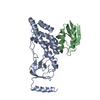
| |||||||||
|---|---|---|---|---|---|---|---|---|---|---|
| 1 |
| |||||||||
| NMR ensembles |
|
- Components
Components
| #1: Protein | Mass: 27223.904 Da / Num. of mol.: 1 / Fragment: AMINO-TERMINAL DOMAIN RESIDUES 1 - 249 Source method: isolated from a genetically manipulated source Source: (gene. exp.)   References: UniProt: P08839, phosphoenolpyruvate-protein phosphotransferase |
|---|---|
| #2: Protein | Mass: 9129.332 Da / Num. of mol.: 1 Source method: isolated from a genetically manipulated source Source: (gene. exp.)   |
-Experimental details
-Experiment
| Experiment | Method: SOLUTION NMR |
|---|---|
| NMR details | Text: THE 3D STRUCTURE OF THE EIN-HPR COMPLEX WAS SOLVED BY MULTI-DIMENSIONAL HETERONUCLEAR NMR AND IS BASED ON 5475 EXPERIMENTAL NMR RESTRAINTS:' INTRAMOLECULAR EIN NOES: 746 SEQUENTIAL (|I-J|1), ...Text: THE 3D STRUCTURE OF THE EIN-HPR COMPLEX WAS SOLVED BY MULTI-DIMENSIONAL HETERONUCLEAR NMR AND IS BASED ON 5475 EXPERIMENTAL NMR RESTRAINTS:' INTRAMOLECULAR EIN NOES: 746 SEQUENTIAL (|I-J|1), 517 MEDIUM RANGE (1 < |I-J <= 5), 436 LONG RANGE (|I-J|>5) INTERRESIDUE NOES AND 486 INTRARESIDUE NOES. INTRAMOLECULAR HPR NOES: 247 SEQUENTIAL (|I-J|1), 167 MEDIUM RANGE (1 < |I-J <= 5), 246 LONG RANGE (|I-J|>5) INTERRESIDUE NOES AND 202 INTRARESIDUE NOES. INTERMOLECULAR NOES BETWEEN EIN AND HPR: 117 TORSION ANGLE RESTRAINTS 768 FOR EIN AND 170 FOR HPR. 3JHNA COUPLING CONSTANT RESTRAINTS: 34 FOR HPR 13CALPHA AND 13CBETA CHEMICAL SHIFT RESTRAINTS: 503 FOR EIN, 162 FOR HPR. ONE-BOND N-H DIPOLAR COUPLING CONSTANT RESTRAINTS: 165 FOR EIN AND 79 FOR HPR |
- Sample preparation
Sample preparation
| Sample conditions | pH: 7 / Temperature: 313 K |
|---|---|
| Crystal grow | *PLUS Method: other / Details: NMR |
-NMR measurement
| NMR spectrometer |
|
|---|
- Processing
Processing
| Software |
| ||||||||||||
|---|---|---|---|---|---|---|---|---|---|---|---|---|---|
| NMR software |
| ||||||||||||
| Refinement | Method: simulated annealing / Software ordinal: 1 Details: THE STRUCTURES WERE CALCULATED USING THE SIMULATED ANNEALING PROTOCOL OF NILGES ET AL. (1988) FEBS LETT. 229, 129-136 USING THE PROGRAM CNS MODIFIED TO INCORPORATE COUPLING CONSTANT ...Details: THE STRUCTURES WERE CALCULATED USING THE SIMULATED ANNEALING PROTOCOL OF NILGES ET AL. (1988) FEBS LETT. 229, 129-136 USING THE PROGRAM CNS MODIFIED TO INCORPORATE COUPLING CONSTANT RESTRAINTS (GARRETT ET AL. (1984) J. MAGN. RESON. SERIES B 104, 99-103), CARBON CHEMICAL SHIFT RESTRAINTS, (KUSZEWSKI ET AL. (1995) J. MAGN. RESON. SERIES B 106, 92-96) RESTRAINTS, AND RESIDUAL DIPOLAR COUPLING RESTRAINTS (CLORE ET AL. J. MAGN. RESON 131, 159-162 (1998); J. MAGN 133, 216-221(1998)). IN THIS ENTRY THE LAST COLUMN REPRESENTS THE AVERAGE RMS DIFFERENCE BETWEEN THE INDIVIDUAL SIMULATED ANNEALING STRUCTURES AND THE MEAN COORDINATE POSITIONS. THE LAST COLUMN IN THE INDIVIDUAL SA STRUCTURES HAS NO MEANING. FITTING TO GENERATE THE AVERAGE STRUCTURE IS WITH RESPECT BEST TO RESIDUES 1 - 250 (RESIDUES 251 - 249 ARE DISORDERED IN SOLUTION) OF ENZYME I AND RESIDUES 1-85 OF HPR. RESIDUES 251-249 ARE OMITTED FROM THE MEAN STRUCTURE. | ||||||||||||
| NMR ensemble | Conformer selection criteria: REGULARIZED MEAN STRUCTURE / Conformers calculated total number: 40 / Conformers submitted total number: 1 |
 Movie
Movie Controller
Controller





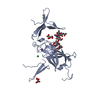

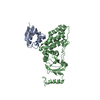
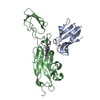
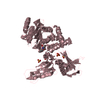
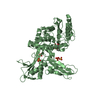
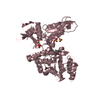
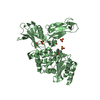
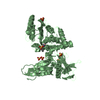
 PDBj
PDBj
